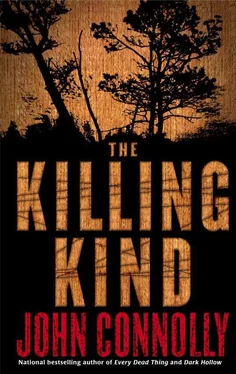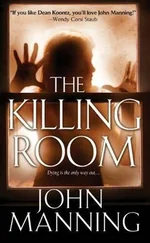It was the Cloisters Apocalypse, dating from the early part of the fourteenth century, and the illustration on the opened page was almost identical to that which I had found on the Fellowship's literature. It depicted a multieyed beast with long, vaguely arachnid legs slaughtering sinners with a spear while Christ and the saints looked on impassively from the right-hand corner of the page. According to the explanatory note in the case, the beast was killing those whose names did not appear in the Lamb of God's Book of Life. Below it was a translation of an illustrator's note added in Latin in the margins: “For if the names of the saved are to be recorded in the Book of Life, shall not also the names of the damned be written, and in what place may they be found?”
I heard the echo of the threat made by Mr. Pudd against Mickey Shine and his family: their names would be written. The question, as the illuminator had posed, was, Written where?
It was now ten, but I could see no sign of Mickey Shine. I left the Treasury, walked through the Glass Gallery, and opened a small unmarked door that led out into the Trie Cloister. The only sound, apart from the fall of the rain, came from the trickling of water in the fountain at the center of the marble arcades, dominated in turn by a limestone cross. To my right, an opening led out to the exposed Bonnefont Cloister. When I stepped through it, I found myself in a garden, the Hudson River and the New Jersey shoreline in front of me, the tower of the Gothic Chapel to my far right. To my left was the main wall of the Cloisters itself, a drop of maybe twenty feet leading to the ground below. The other two sides of the square consisted of pillared arcades.
The garden had been planted with shrubs and trees common in medieval times. A quartet of quince trees stood in the middle, the first signs of the yellow fruit now appearing. Valerian was overshadowed by the huge leaves of black mustard; nearby grew caraway and leek, chive and lovage, madder and Our-Lady's-bedstraw, the last two constituent ingredients in the dyes used by artists for the manuscripts on display in the main body of the museum.
It took me seconds to notice the new addition to the garden. Against the far wall, beside the entrance to the tower, grew an espaliered pear tree, its shape resembling a menorah. The bare branches were like hooks, six of them growing out from the main artery of the tree. Mickey Shine's head had been impaled on the very tip of that central artery, turning him to a creature of both flesh and wood. Tendril-like trails of coagulating blood hung from the neck, and the rain damped the pallor of his features as water pooled in the sunken sockets of his eyes. Tattered skin blew softly in the wind, and there was blood around his mouth and ears. His ponytail had been severed during the removal of his head and the loose hair now stuck lankly to his gray-blue skin.
I was already reaching for my gun when the thin, spiderlike shape of Mr. Pudd emerged from the shadow of the arcade to my right. In his hand he held a Beretta fitted with a suppressor. My hand froze. He told me to move my hands away from my body, slowly. I did.
“So here we are, Mr. Parker,” he said, and the eyes behind their dark hoods gleamed with a hostile intensity. “I hope you like what I've done with the place.”
His left hand gestured to the tree. Blood and rain pooled at its base, creating a dark reflection of what lay above. I could see Mickey Shine's face shimmer as the raindrops fell, seeming to add life and expression to his still features.
“I found Mr. Sheinberg in a nickel-and-dime hotel,” he continued. “When they discover what's left of him in his bathtub, I fear it will be merely a nickel hotel.”
And still the rain fell, soaking me through my coat. It would keep the tourists away, and that was what Mr. Pudd wanted.
“The idea was mine,” he said. “I thought it was appropriately medieval. The execution-and it was an execution-was the work of my… associate.”
Farther to my right, still sheltered by the arcade, the woman with the mutilated throat stood against a pillar, an open rucksack on the stone before her. She was watching us impassively, like Judith after disposing of the head of Holofernes.
“He struggled a great deal,” elaborated Mr. Pudd, almost distractedly. “But then, we did start from the back. It took us some time to hit the vertebral artery. After that, he didn't struggle quite so much.”
The weight of the Smith amp; Wesson beneath my coat pressed against my skin, like a promise that would never be fulfilled. Mr. Pudd returned his attention fully to me, raising the Beretta slightly as he did so.
“The Peltier woman stole something from us, Mr. Parker. We want it back.”
I spoke at last. “You were in my house. You took everything that I had.”
“You're lying. And even if you are not, I suspect you know who does have it.”
“The Apocalypse?” It was a guess, but a good one. Mr. Pudd's lips twitched once, and then he nodded. “Tell me where it is, and you won't feel a thing when I kill you.”
“And if I don't tell you?” From the corner of my eye, I saw the woman produce a gun and aim it at me. As she moved, so too did Mr. Pudd. His left hand, which had been concealed in the pocket of his coat until then, appeared from the folds. In it, he held a syringe.
“I'll shoot you. I won't kill you, but I will disable you, and then…” He raised the syringe and a stream of clear liquid issued from the needle.
“Is that what you used to kill Epstein?” I asked.
“No,” he answered. “Compared to what you will endure, the unfortunate Rabbi Epstein passed comfortably into the next world. You're about to experience a great deal of pain, Mr. Parker.”
He angled the gun so that it was pointing at my belly, but I wasn't looking at the gun. Instead, I watched as a tiny red dot appeared on Mr. Pudd's groin and slowly began to work its way upward. Pudd's eyes dropped to follow my gaze and his mouth opened in surprise as the dot continued its progress over his chest and neck before stopping in the center of his forehead.
“You first,” I said, but he was already moving. The first bullet-blew away a chunk of his right ear as he loosed off a shot in my direction, the rain hissing beside my face as the heat of the slug warmed the air. Then three more shots came, tearing black holes in his chest. The bullets should have ripped through him, but instead he lurched backward as if he had been punched hard, the impact of the shots sending him tumbling over the wall.
Shards of stone sprang up close to my left leg and I heard the dull sound of the suppressed shots echoing around the arcade. I drew my gun, dove for the cover of the chapel tower, and fired at the pillar where the woman had been standing, but she had stooped low and was scuttling toward the door to the Glass Gallery, her gun bucking as shots came at her from two directions: from the wall where I stood and from the arcade where Louis's dark form was moving through the shadows to intercept her. The door to the gallery opened behind her and she disappeared inside. I was about to follow when a bullet whistled past my ear and I dived to the ground, my face buried in the clump of Our-Lady's-bedstraw. Across from me, Louis leaped over the wall of the arcade as I raised myself up and crawled behind the main wall. I took a deep breath and peered over.
There was nobody there. Pudd was already gone, a smear of blood on some flattened grass the only indication of his former presence.
“Follow the woman,” I said. Louis nodded and ran to the gallery, his gun held discreetly by his side. I climbed onto the wall and then jumped, landing heavily on the ground and rolling down the slope. I sprang up quickly when I came to a stop, the gun outstretched, but Pudd was nowhere to be seen. I moved west, following the trail of blood along the main wall of the Cloisters, until somewhere at the far side of the building I heard a shot fired, then another, followed by the squealing of tires. Seconds later, a blue Voyager sped down Margaret Corbin Drive. I ran to the road, hoping for a clear shot, but an MTA bus turned the corner at the same time and I held my fire for fear of hitting the bus or its passengers. The last thing I saw as the Voyager disappeared was a figure slumped forward on the dashboard. I wasn't certain, but I thought it was Pudd.
Читать дальше












